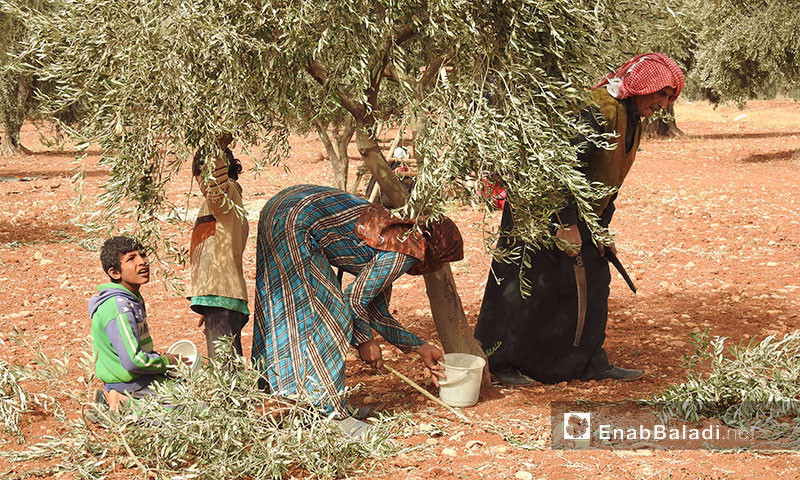Enab Baladi – Idlib | Under the slogan “the Tree of Freedom,” activists launched a campaign aimed at planting 3,000 olive trees in the city of Kafr Takharim in the western countryside of Idlib, in honor of the lives of the martyrs in general, and the martyrs of the Qah camp massacre in particular.
The campaign, which started in its first stage with the planting of 900 trees on the outskirts of the city, at the end of last November, will extend to other areas in the city of Idlib, such as the cities of Ben Nash, Maarat al-Numan and Darkush, according to Ahmed Jibs, one of the media activists involved in the campaign.
The Syrian Civil Defense Forces, which participated in the campaign at the invitation of the activists of the Syrian revolution in the north of Syria, had launched a campaign of afforestation in the city of Khan Shaykhun in the first month of this year. During the campaign, hundreds of trees were planted in the city corners, schools and on the outskirts of public roads to preserve the beauty of the area and to protect the environment.
Small initiatives by activists and people in the area, with assistance projects from some organizations, were also launched to be extended for several months in the winter, in an attempt to plant more trees. However, the planting process do not often succeed as plants end up dead from drought in the summer, due to the lack of irrigation and maintenance, one of the city of Binnish farmers, who spoke on condition of anonymity, told Enab Baladi.
With the absence of official figures and statistics about the agricultural lands and the number of trees affected by the bombing of Idlib and its countryside, Abd al-Hadi Obaid, an agricultural engineer from the city of Binnish, clarifired to Enab Baladi that the number of trees in Idlib countryside is in a significant decrease for several reasons. The most important of these is the uprooting process taking place in battle areas to uncover the roads, and the decline of public pest control due to fraud in agricultural materials such as seeds, fertilizers, pesticides and nutrients or corruption, as well as the high cost of reliable brands. Thus, the farmers are obliged to pay higher prices with no actual result in return.
Obaid added that the intense bombing, which targeted Idlib city, in addition to breaking branches and uprooting trees, led to the spread of the olive tuberculosis disease, due to the wounds in the trees as a result of to the shelling. The pistachio trees in the city of Khan Shaykhun were also significantly damaged.
He also believed that one of the obstacles, hindering the efforts of the farmers and owners of vineyards in Idlib, is the high cost of irrigation water. Some of the farmers in Mseibin, south of the city, which is famous for growing olives, figs and Prunus mahaleb, were obliged to cultivate cumin with the olive trees, in order to sell the harvest and provide money to buy irrigation water for vineyards, despite being aware of the threats to olive trees due to this kind of agriculture.
In Arihah, and around the camp of al-Karmid in particular, the area was devoid of olive trees and there are only stumps left. The citizens of the area are trying to restore the vegetation by vaccination, and planting Prunus mahaleb as well as pomegranate trees instead.

